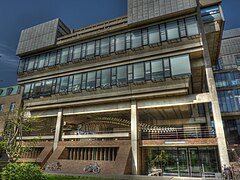Cambridge University Museum of Zoology

Giant Finback whale at the Museum of Zoology
|
|
| Country | United Kingdom |
|---|---|
| Location | Cambridge |
| Collection | |
| Items collected | Fossils, vertebrates, Birds, Insects, Molluscs, Invertebrates |
| Other information | |
| Director | Professor Paul Brakefield |
| Website | Museum.zoo.cam.ac.uk |
The University Museum of Zoology is a museum of the University of Cambridge and part of the research community of the Department of Zoology. The Museum houses an extensive collection of scientifically important zoological material. The collections were Designated in 1998 by the Museums, Libraries and Archives Council (now managed by the Arts Council England) as being of outstanding historical and international importance.
The Museum of Zoology is on the New Museums Site, just north of Downing Street in central Cambridge, England. Admission is free (2014).
The Museum is currently closed (2014) while it undergoes a major redevelopment, for which it has been awarded a grant of £1.8m by the Heritage Lottery Fund. The redevelopment aims to create displays and new interpretation to engage people with the wonders of animal diversity; create new stores to care for the Museum’s internationally significant collections to the highest standards and expand the Museum’s learning programmes, reaching out to wider audiences and increasing online resources. The museum will reopen in autumn 2017.
The Museum is one of the eight museums of the University of Cambridge Museums consortium.
Much of the Museum’s material derives from the great collecting expeditions of the 19th century, which provided the first documentation of the fauna in many parts of the world. The earliest exhibits come from the Harwood anatomical collection which was purchased in 1814. The museum added further collections including birds from Swainson and animals from the Cambridge Philosophical Society, to which Charles Darwin himself had contributed.
Past Superintendents of the museum include: William Clark 1817-1866, John Willis Clark 1866-1892, Sidney Frederic Harmer 1892-1908, Reginald Crundall Punnett 1908-1909, and Leonard Doncaster 1909-1914.
...
Wikipedia
